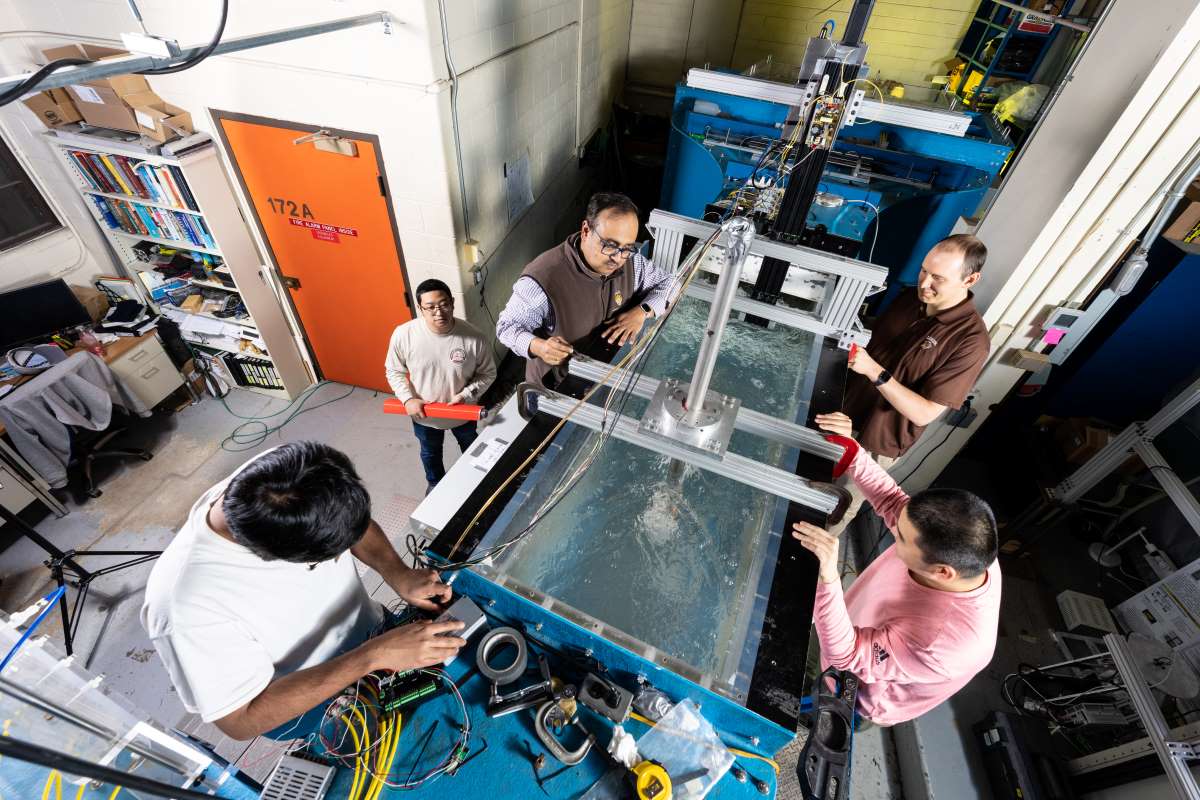
The U.S. Department of Energy (DOE) recently granted the Atlantic Marine Energy Center (AMEC) $12 million to expand research and development in marine energy initiatives. AMEC comprises four universities including the University of New Hampshire, Stony Brook University, the Coastal Studies Institute, and Lehigh University.
In total, DOE’s Water Power Technologies Office invested more than $41 million in this latest round of funding using the Bipartisan Infrastructure Law (BIL) to four university-led National Marine Energy Centers located across the country. The centers will use the funds to support research, infrastructure improvements, strategy, administration, outreach, and communications around their projects.
The grant follows the $9.7 million that DOE awarded the four AMEC universities in 2021, which served to initially establish the center.
“This is a five-year award that will allow us to expand the scope and reach of AMEC,” says AMEC co-director Arindam Banerjee, who is Lehigh’s Paul B. Reinhold Professor of Mechanical Engineering and Mechanics and department chair in the P.C. Rossin College of Engineering and Applied Science. “And we’ll be doing that by, among many things, developing a series of week-long summer courses, launching new research projects, and improving our test facilities.”
The new courses are currently being developed by the AMEC leadership team across the four AMEC institutions. They will kick off this summer with a weeklong Introduction to Marine Energy short course held at UNH. In total, up to five new classes will be offered, covering topics including instrumentation for marine energy, marine resource characterization, coastal microgrids, and flexible structures for marine energy. Some will be open to all; others will target students and professionals currently researching and/or working in the field.
“We’ll have two tiers of courses,” says Banerjee. “The first will be like a boot camp, where students will be exposed to the fundamentals of marine energy systems. It might attract, for example, a senior from any engineering major who is curious about marine energy but doesn’t want to commit to a traditional course. They’ll get a good introduction to the fundamentals and the experts, and hopefully it will help guide their decision about graduate school. The second tier of classes will be highly specialized, graduate-level courses that give students and professionals an immersive experience in a single topic within marine energy.”
A second key part of this newest grant will see Lehigh take the lead on two research projects—one focused on the structural performance of tidal turbine blades under turbulent loading, and the other on real-time stable marine energy microgrid power management for coastal communities.
“Our original AMEC team here at Lehigh consists of seven faculty members, and we’ve now added three more, all of whom are involved in these projects,” says Banerjee, who will be running the first project out of his own lab, Lehigh’s Tidal Turbulence Test Facility.
That project will involve small-scale testing of turbine blades in Banerjee’s lab followed by large-scale numerical simulations at Lehigh’s High-Performance Computing Center conducted by Parisa Khodabakshi, an assistant professor of mechanical engineering and mechanics and one of the new faculty members of AMEC. Large-scale experiments will be performed at Lehigh’s Advanced Technology for Large Structural Systems (ATLSS) Engineering Research Center by Richard Sause, the Joseph T. Stuart Professor of Structural Engineering.
“Typically, experiments or simulations are done at one scale,” says Banerjee. “This is a unique study in that we’re doing experiments across scales and using simulations to serve as a bridge between them.”
The second project will attempt to integrate marine renewable energy resources, in this case, wave energy converters, into coastal microgrids. It’s a multidisciplinary effort that includes Farrah Moazeni, an assistant professor of civil and environmental engineering; Javad Khazaei, an assistant professor of electrical and computer engineering (both Moazeni and Khazaei are also among the latest to join AMEC); and Banerjee.
“Our aim is to design a real-time, closed-loop control system for marine energy microgrids that not only optimally allocates energy resources, but also guarantees stability in the face of fluctuations and uncertainties from loads, weather, and renewable resources,” says Moazeni, who will lead the project as well as teach one of the advanced short courses. “Coastal and island communities often lack access to reliable and stable energy sources. With this grant, I hope we can take a meaningful step toward providing stable energy resources capable of withstanding the challenges posed by climate change to these vulnerable communities.”
Additionally, Lehigh will contribute data and the expertise of Muhannad Suleiman and Paolo Bocchini—both professors in the Department of Civil and Environmental Engineering and members of AMEC—to several other projects led by other institutions within AMEC.
The grant also supports more infrastructure improvements that will facilitate both these and future projects. For example, Khazaei, who is the director of the Integrated, Resilient, and Intelligent Energy Systems (INTEGRITY) Laboratory—will lead the development of a multi-port converter for marine renewable energy integration to coastal community microgrids.
“There is significant potential for energy extraction from the ocean, which is an area that remains largely underexplored,” says Khazaei. “This latest AMEC award offers Lehigh the opportunity to delve into new research areas and foster multidisciplinary collaborations that were previously out of reach.”
As part of the award, the Lehigh AMEC team will also conduct community outreach to showcase the work of the center, contribute to ongoing strategy and implementation plans for AMEC and for all the nation’s marine energy centers, and participate in performance reviews.
“The first AMEC award got Lehigh established as a center, and with this latest funding, we’re starting the real work of making marine energy part of the solution to decarbonization and to meeting our nation’s energy needs,” says Banerjee. “I’d love to time travel to July 2029 when the period for this grant is up to see all that we’ve accomplished. It’s a very exciting time to be in this field, and lead a group of faculty members who are all committed to sustainability and making the planet a better place to live in for our future generations.”


